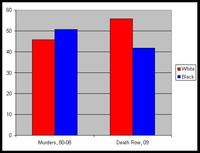Tougher CA Parole-Revoking Rules Struck Down: Bob Egelko of the San Francisco Chronicle
reports a federal judge Thursday ruled that all of California's Proposition 9 provisions for parole revocation were invalid. Proposition 9, passed in 2008, did not guarantee parolees the right to present evidence at
the hearings, allowed parole agents to testify about
incriminating statements by witnesses who were not in court, required the state to provide lawyers only for parolees who appeared
unable to defend themselves, and required the parole board to give more consideration to "the safety of victims and the public" than to the costs and burdens of imprisonment when deciding whether to revoke parole. The ruling does not affect other sections of Proposition 9, which requires prisoners serving life terms to wait up to 15 years between parole hearings and expands the rights of crime victims and their families for taking part in parole proceedings. State prison officials are reviewing the ruling.
Medical Care for Aging Inmates Puts Strain on Prisons: The Associated Press
reports elderly inmates are an increasing population in U.S. prisons. Officials are grappling with how to balance cost factors and public safety while meeting the expensive needs of aging inmates at a time when state budgets are tight. Prison officials have to address questions like whether to install handicap toilets and grab bars in some cells, how to accommodate wheelchairs, or how to manage inmates with dementia. Some states have turned to medical parole, hospice programs, and assisted living facilities. Inmates' health tends to decline more rapidly than the traditional U.S. population due to long-term substance abuse and poor health maintenance. "You can't just generalize about these prisoners," said Texas State Rep. Jerry Madden, chairman of the House Corrections Committee. "Some are
still extremely dangerous, some may not be.... Some you wouldn't want in
the same assisted living facility with your parents or grandparents."
Komisarjevsky Formally Sentenced to Death in Connecticut Home Invasion Murders: The Associated Press
reports Joshua Komisarjevsky was formally sentenced to death in Connecticut today. Komisarjevsky denied having any part in the three killings he was convicted of. Dr. William Petit, who survived the attack, called the loss of his wife and two daughters "a personal holocaust." Komisarjevsky will join his accomplice on death row. Both men were on parole at the time of the deadly home invasion crime. The 2007 attack sparked tougher state laws for repeat offenders and home invasions, and led to the defeat of a bill to abolish the death penalty in Connecticut.
Executions Stayed in Ohio and Texas: Christine Lee of NBC 5 Dallas-Forth Worth and the Associated Press
report Donald Newbury, one of the "Texas 7," has won a stay in his execution scheduled for February 1 for killing a police officer after escaping from a Texas prison in 2000. U.S. Supreme Court Justice Antonin Scalia granted the stay Thursday after Newbury's attorneys argued it should be granted while the U.S. Supreme Court considers a case out of Arizona that questions death row inmates' entitlement to better legal assistance during their initial appeals. In Ohio, the Associated Press
reports a federal judge on Wednesday delayed the execution of Michael Webb, who was scheduled to be executed February 22 for the 1990 arson death of his 3-year-old son. U.S. District Judge Gregory Frost's one-page ruling addressed challenges to Ohio's lethal injection procedures and a debate over whether executions should be halted due to minor variations to the policies. Frost delayed the execution of Charles Lorraine earlier this month, saying the state deviated from its execution policies. Ohio has filed a motion with the U.S. Supreme Court to overturn that ruling. Ohio Attorney General Mike DeWine says minor variations in the execution policy are not the same thing as an unconstitutional system, and even Frost has said the rulings are not a commentary on the constitutionality of the state's
execution procedures.
RI Senate Panel Endorses Tougher Good-Time Credits Legislation: David Klepperof the Associated Press reports the Rhode Island Senate Judiciary Committee voted to endorse legislation written by Attorney General Peter Kilmartin that would make offenders of
certain crimes ineligible from earning "good-time" credits. The measure was prompted by last year's release of Michael Woodmansee, who shaved 12 years off his 40 year sentence after being convicted of killing a 5-year-old boy and keeping his bones in his bedroom. The boy's family said no one should have to suffer like they did when they learned Woodmansee was being released early due to good behavior. "We're only talking about the worst of the worst here. Child molesters.
Murderers. Rapists. They just shouldn't be allowed to get out early," said John Foreman V. The director of the state's Department of Corrections says prison bills will be higher if more prisoners are serving their entire sentence. "Of course it would be additional costs," said Senator Glenford Shibley (R-Coventry). "But some things are worth the cost."

